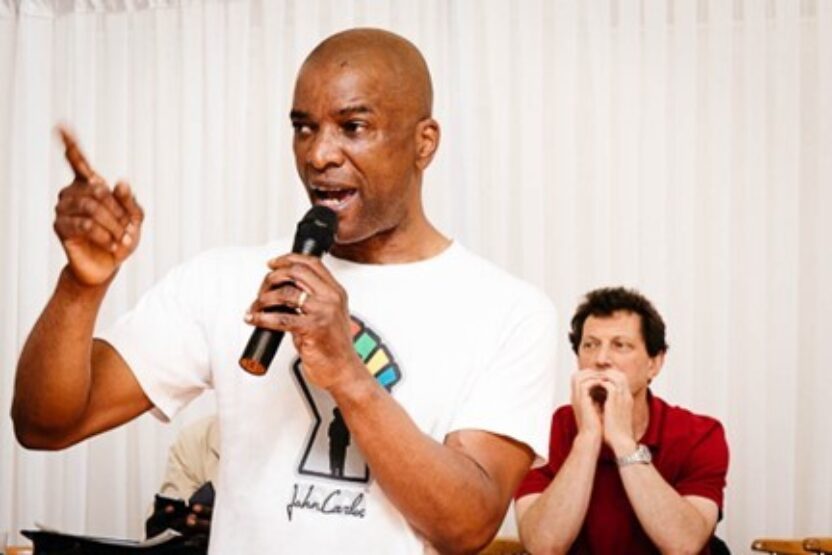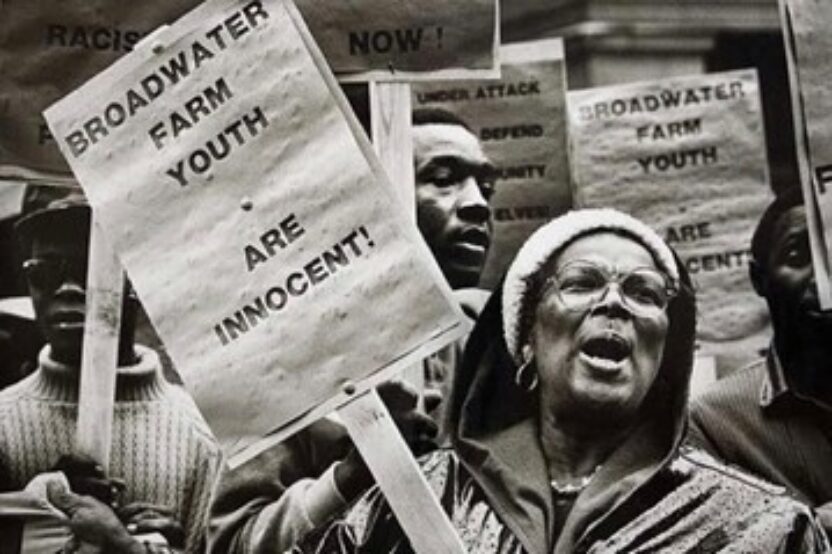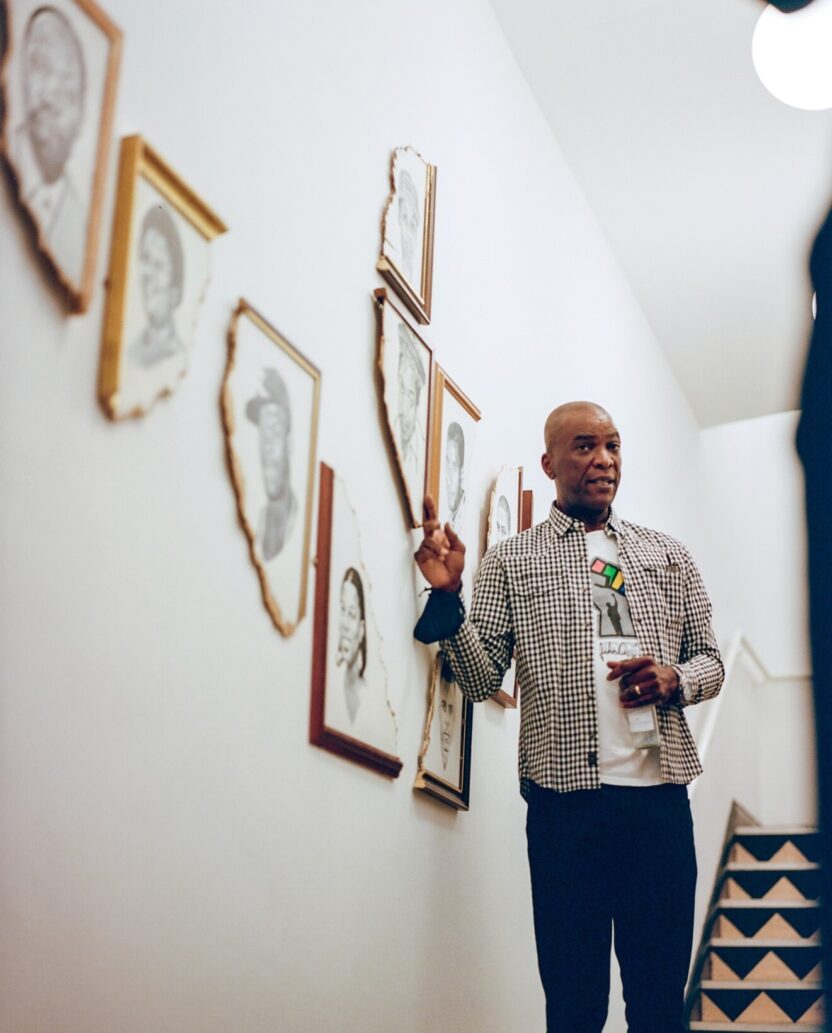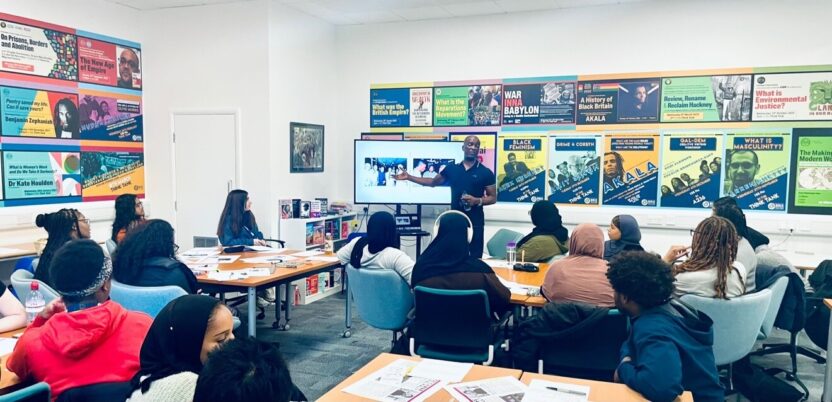An interview with Stafford Scott, Director of Tottenham Rights

As part of Black History Month, we seek to celebrate and share the stories of Black individuals who are demonstrating exceptional leadership, talent, and impact in healthcare throughout the year.
Here we speak with Stafford Scott; community activist, race equality specialist and Director of Tottenham Rights, a community organisation campaigning for racial and social justice for Black communities of Tottenham and beyond.
Stafford has worked within the NHS and in the then Department of Health, as a race equality consultant and is the co-curator of Open Wounds, a ground-breaking exhibition hosted by The Kings Fund which explores the connections between health, racism and inequalities, and how this has affected generations of Black people, through the eyes of the Black community themselves.
Can you tell us a bit about your background and what inspired you to become an advocate for civil rights and social justice, leading to your role as the Director of Tottenham Rights?
My activism is based on my lived experiences growing up in England in the 1960s when racism was much more overt and in your face than it is today. As a child growing up in Tottenham, I had to contend with racism on multiple levels. There was the everyday direct racism we faced on the streets, where people would call us all sorts of racist names simply because they felt they could. Additionally, there were racist groups like the National Front, who advocated for the repatriation of all Black people, including those born here. Moreover, we had to confront the earliest manifestations of institutional racism - not just the acts of racism perpetuated by those in office, but also the denial of its existence and the victim-blaming that followed.
I personally experienced direct and institutional racism on numerous occasions. The most significant instance was when I was arrested under the Suspicious Person Act, commonly known as the Sus laws. I, along with my older brother and four school friends, was falsely accused of a crime that had not even occurred. It wasn't a case of mistaken identity; we were framed by Flying Squad officers who went on to lie about what had transpired in court. The sus laws required no more than the words of two officers for a conviction. They did not have to produce a victim or any corroborating evidence. Like thousands of our peers before us, we were found guilty. My brother and three of our friends, who had previous convictions, were sent to a Detention Centre, while my other friend and I, who had previously been of good character, received criminal records and fines. This incident sent me off the rails. Although I had never committed a crime before this, within a year, I was sent to Youth Prison for crimes that I had indeed committed.
During my time in prison, the library provided access to books that we didn't have in school. Suddenly, I had the opportunity to read about the Civil Rights movement in the USA. I learned about Martin Luther King Jr., Malcolm X, and Marcus Garvey. I delved into the history of the Black Panther Party and their commitment to community service. Most importantly, I learned what it truly meant to be a part of a movement fighting for justice and equality. After my release, I was determined to channel my experiences into advocacy and activism. I became actively involved in grassroots organisations, working tirelessly to challenge systemic racism and discrimination. My journey eventually led me to establish Tottenham Rights CIC, where I now serve as the Director.
I must also mention that I am now a curator, having curated the record-breaking "War Inna Babylon" exhibition at the Institute for Contemporary Arts in 2021 and "Open Wounds" at The Kings Fund, where I am also an Associate Consultant. Additionally, I am a Guest Professor of Forensic Architecture at Goldsmiths University. While all these titles are significant, the one that brings me the most joy is Veteran Community Activist as it implies that I have been an activist for a long time and that I have made some impact within that time.

"Open Wounds" is a powerful online exhibition that explores themes of history, memory, and reconciliation. What motivated you to curate this exhibition? How can an understanding of historical injustices help inform and shape a more inclusive and equitable future, raising awareness and inspiring change in the healthcare sector and beyond?
Raising awareness through exhibitions like "Open Wounds", which I co-curated with my daughter Kamara, can play a significant role in sparking conversations, challenging biases, and promoting empathy. It can help individuals and communities understand the historical context of healthcare disparities and inspire action towards creating a more just and equitable future. By shedding light on past injustices, the exhibition sought to encourage reflection, dialogue, and engagement with the issues at hand. We believe that it has the potential to foster a collective commitment to dismantling systemic barriers and promoting inclusivity in healthcare and society as a whole.
Understanding historical injustices is crucial because it helps us recognise the systemic roots of present-day disparities and inequities. In the healthcare sector, historical injustices such as medical experimentation on marginalised communities, failure to address long-standing health inequalities, and discriminatory policies have had long-lasting impacts on access to healthcare, trust in the system, and health outcomes. By acknowledging and learning from these historical injustices, we can work towards addressing deep-seated inequities that persist today. This allows us to develop policies, practices, and interventions that are sensitive to the needs and experiences of marginalised communities, particularly those disproportionately affected by healthcare disparities. Ultimately, the goal is to inspire change by galvanising individuals, organisations, and policymakers to take concrete steps towards addressing healthcare inequalities, promoting equity, and ensuring that everyone has equal access to quality healthcare.
By acknowledging and learning from these historical injustices, we can work towards addressing deep-seated inequities that persist today. This allows us to develop policies, practices, and interventions that are sensitive to the needs and experiences of marginalised communities, particularly those disproportionately affected by healthcare disparities.
In your opinion, what are some of the most pressing challenges and disparities in healthcare that disproportionately affect Black communities? How can we work towards a more inclusive and equitable healthcare system and what steps do you believe organisations working in the healthcare sector can take to promote inclusivity, diversity, and equity?
There are several pressing challenges and disparities in healthcare that disproportionately affect Black communities. One of the biggest issues is systemic racism and bias within the healthcare system itself. This can lead to lower quality care and worse health outcomes for Black patients. Additionally, Black people are more likely to experience chronic health conditions like hypertension and diabetes, which can be exacerbated by social determinants of health such as poverty, inadequate access to healthy food, and lack of access to healthcare.
To work towards a more inclusive and equitable healthcare system, it is important to address these disparities head-on. This can involve increasing diversity within the healthcare workforce, implementing anti-racist policies and practices, and investing in community-based health initiatives that prioritise the needs of marginalised communities. Organisations working in the healthcare sector can take several steps to promote inclusivity, diversity, and equity:
- Developing and implementing diversity and inclusion training programs for healthcare providers.
- Increasing representation of Black healthcare professionals at all levels, from entry-level positions to leadership roles.
- Investing in community-based health initiatives that prioritise the needs of marginalised communities.
- Implementing anti-racist policies and practices to address systemic bias within the healthcare system.
These efforts are crucial because they can help address the root causes of healthcare disparities and promote better health outcomes for all patients, regardless of race or ethnicity. By working towards a more inclusive and equitable healthcare system, we can ensure that all patients receive the high-quality care they deserve.
As Black History Month is a time for reflection and celebration of the achievements and contributions of Black individuals and communities - with this year's particular focus on 'Saluting our Sisters' - please share a story or person from history who has inspired your work in promoting social justice and equality.
Dolly Kiffin, Martha Osamor, and my mum have been significant inspirations in my work.
Dolly and Martha, who is now in the House of Lords as Baroness Osamor of Tottenham and Asaba in the Republic of Nigeria, were the matriarchs on the Broadwater Farm estate in Tottenham where I first undertook Youth & Community Development work in my early twenties. Under their guidance and leadership I became one of the local Youth Leaders within the community. They and others inspired me to become the activist that I am today.
But the Sister that I should really salute is actually not a Sister at all as she is my mother Beverley Scott.

Whilst my dad taught me how to fight it was my mum who taught me what to fight for. She was the first ever Black female Shop Stewards at Fords Motor Company in Enfield. As this was in the 1970’s its safe to assume that she was one of the few female shops stewards across the country. She was also well known locally not just within her own generation but across generations. Everybody knew Mrs Scott as she helped and supported all those that she could. As a youngster she would tell me that those who know better should do better, this was a lesson in leadership that I adhere to as a guiding principle as it infers a level of responsibility on you to make sure that you are doing what’s right not what’s simply most expedient.
I would also like to mention my daughter Kamara if I may. We have co curated two notable exhibitions in the past three years and its been a joy to work with her and to learn from her at the same time
As a youngster she would tell me that those who know better should do better, this was a lesson in leadership that I adhere to as a guiding principle as it infers a level of responsibility on you to make sure that you are doing what’s right not what’s simply most expedient.

What are some of the upcoming projects and initiatives that you are excited about, and how can our readers stay engaged with your work and the mission of Tottenham Rights?
At Tottenham Rights we pride ourselves on undertaking cutting edge community activism. This means that we undertake programmes and projects that are designed to change or challenge the status quo. Kamara and I have been Guest Professors of Forensic Architecture at Goldsmiths University where we delivered the War Inna Babylon Lecture Series. We are now working with a local independent Sixth Form college, BSix in Hackney as part of their Enrichment Programme to turn the lecture series into an educational resource for colleges. We are particularly proud of this initiative as it has been well received by the students participating on the pilot, as it provides them with a community narrative of struggle and resistance that is all too often unreported by mainstream media outlets.

We are also working in partnership with Queen Mary’s University and Barts Health NHS Trust, amongst others, on a project entitled Partnership for Black Peoples Health with the primary focus of involving Black communities in addressing health inequalities.
We are further working alongside QMUL to train a group of Black men, all over 60 and normally identified as being ‘hard to reach’ in Participative Action Research. The project has been designed to ensure that community members can have meaningful participation in action-oriented research where they can contribute as designers and co-designers of research as opposed to merely being consulted by those with little understanding of the lived experiences of those being consulted. We are really looking forward to facilitating dialogue between this group and local service providers in the months ahead.
We have recently begun a dialogue with Whittington Health NHS Trust who are a local health provider in the London Borough of Haringey where we are based. We are really excited about the prospects of becoming an umbrella organisation undertaking outreach and engagement work on their behalf. We are confident in reaching out to large number of community members who would previously be excluded from involvement activities. We would expect that this will lead to improved access and take up of services leading to fewer unnecessary deaths in our community.
We think that this is particularly timely as many in the local Black community began to lose trust and confidence in the NHS during the pandemic, as the Open Wounds exhibition addresses. Whilst some Heath Trusts might dismiss these people as ‘vaccine hesitant’ and ‘hard to reach’, which we believe is ultimately ‘victim blaming’ and dismissive, but also the standard response, which has led to health disparities in the first place. We believe that forward looking Healthcare organisations recognise that there is a real need and also a responsibility on them to reach out to these groups and communities to build relationships that make people more likely to access healthcare services at an early stage in preference to them turning up at the point of crisis.
Readers can stay engaged with our work via our website www.tottenhamrights.org, although its due an overhaul! Or they can follow us on social media where we are on Twitter @Tottenhamrights or by sending an email requesting to be added to our mailing list to TottenhamRights@protonmail.com
As we celebrate the conclusion of Black History Month, can you share your vision for a more inclusive and equitable future, both in the healthcare sector and society at large?
In envisioning a more inclusive and equitable future, both in the healthcare sector and society at large Tottenham Rights believes that eliminating healthcare disparities is crucial, but to do this we must prioritise addressing healthcare disparities that disproportionately affect marginalised communities, particularly Black communities. This involves tackling systemic racism, improving access to quality healthcare, and addressing social determinants of health. It is also crucial to foster more diversity and better representation in the healthcare sector and society as a whole. This means promoting equal opportunities for underrepresented groups, including Black people, in education, training, and leadership positions. There is also a real need for ensuring that we are cultivating cultural competence. Healthcare providers should receive comprehensive cultural competency training to understand and respect the unique needs and experiences of diverse patient populations. This will help reduce biases, improve patient-provider communication, and enhance healthcare outcomes.
We also need to see a greater Investment in community-based initiatives. Supporting community-based healthcare initiatives that address the specific needs of marginalised communities is essential if we are to address known health inequalities . By collaborating with community organisations, healthcare providers can tailor services to meet the cultural, social, and economic needs of these communities. At Tottenham Rights we are constantly advocating for policy changes. The promotion of equitable policies at local, national, and global levels is vital. This includes advocating for healthcare reforms that address systemic inequities, expand access to healthcare, and prioritise health equity as a fundamental goal. And, by prioritising these aspects, we can work towards a future where healthcare is accessible, inclusive, and equitable for all individuals, regardless of their background or identity. This vision extends beyond the healthcare sector to society at large, fostering a more just and equitable world for everyone.
In conclusion, my personal experiences of racism and injustice have fuelled my passion for civil rights and social justice advocacy. Through my work with Tottenham Rights and other initiatives, I am committed to fighting for equality, empowering marginalised communities, and creating a more equitable future for all.
Together, we can make a difference and bring about positive change.
